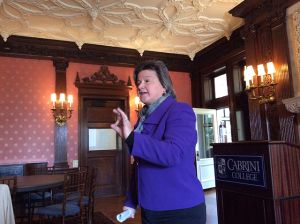
According to Immigration the Policy Center, Pennsylvania is home to 755,410 immigrants and 50.5 percent of those immigrants are undocumented.
Robin Larkins, Director of Cabrini Immigrant Services, along with Marianne McGowen, Education Coordinator, and two other volunteers spoke to students, faculty and staff on Thursday, Nov. 14 about their work and some challenges they have had to overcome within the past few years. Their work deals with these undocumented and documented immigrants.
In the intimate setting of the mansion dining room, everyone gathered around tables with their brown bagged lunches and waited for the presentation to begin.
Larkins started off giving the opening remarks followed by a brief introduction of their work.
“We are Cabrini, we accompany, we meet people where they are as they are and we accompany them, that’s what we are called to do first and foremost and then we solve the problems.”
Cabrini Immigrant Services provides Naturalization and Immigration Legal Services, tutoring and mentoring for students of all levels, health care, benefits, social services referrals, enculturation experiences, children’s education, advocacy and support. Many different types of immigrants come in and out of their office each and every day, but 29 percent of the returning students are from Central America. CIS has provided services to individuals from 103 different countries between 1999-2012. Within Dobbs Ferry community, where CIS is located, 13 percent of the communities are non-citizens and there is a 33.8 percent immigration population increase, which is the largest growing segment of population.
“I would have loved to see this country to be able to function and have passed some immigration reform,” Larkins said. “It would not have been perfect, it would not have been the most progressive thing that would have been up there, but it would have been something.”
Not only was CIS built on Mother Cabrini’s traditions to bring God’s love to the world through personalized, compassionate and quality service with an emphasis on justice and respect for all but it has been an eye-opening experience for all of the workers and volunteers.
Even though all of the employees and volunteers would prefer a comprehensive immigration reform they say that it is unlikely for that to happen so soon, but are hoping for some type of reform.
Larkins specifically talked about how the government and congress needs to learn to act. She also talked about how the United States are already well into the second generation of people who have not been able to find any form of relief and who have to essentially live and raise their family in this country and they are not going back to their home countries. Larkins believes that eventually the process of immigration reform will create a permanent underclass.
“Sociologically, economically, what that means is that it’s going to create a bigger divide than we even speak of today because we’re going to have a permanent underclass that even with what was proposed with immigration reform the income requirements, the fines, the things that are paid I could tell you right now, 80 percent of the families that we provide multi-levels of services to and people who we have close relationships with, could have applied for not being deported but they would never be citizens, never in their lifetime,” Larkins said.
Calling the immigration system broken and explaining that it does not make sense, Larkins passed the microphone to McGowen who talked about a specific immigration story.
Amore, a 65 year-old adult student and undocumented Dominican woman came to America many years ago to work taking care of an elderly woman so she could pay for her children to go to private schools in the Dominican Republic.
“I think the typical person in the United States has no clue that there’s such a disparity between how the immigration system works and how the legal injustice system that we have come to learn about and believe that would affect us as US citizens, is so different,” Larkins said. “And that comes back to issues of basic human rights that we are clearly not focusing on in our preventative structure.”
Larkins believes that nowadays people who have a lot of anti-immigrant segment are very quick to judge and related how if anyone were to look at their own ancestry stories anyone would find that those stories are not much different from the ones heard about today.
“The system has become restricted and therefore people become more fearful of something that, probably that they don’t know or whatever that made be, it is very disconcerting to me,” Larkins said. “Are we that far removed from our own stories that we can’t have any relation to what’s happening now?”


